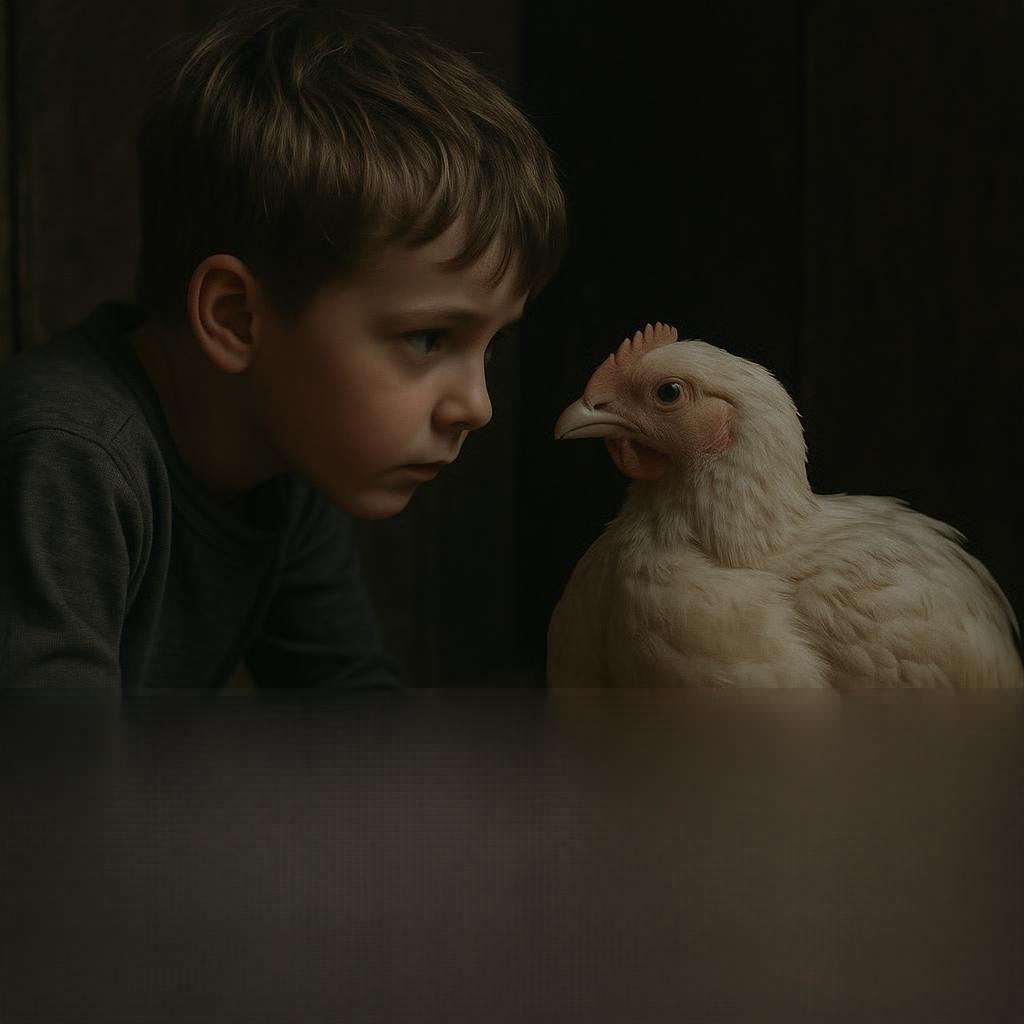The One Who Couldn’t Stand
He was nine when he met him … the little chicken who couldn’t walk.
He had no name. Just a number on a crate, scrawled in red marker: 742-A. The workers didn’t look at him. They didn’t need to. They moved fast, lifting box after box, where dozens of chicks chirped and scratched and blinked their first and last hours of light.
But this one didn’t move.
He sat in the corner, legs twisted beneath a body too large for his bones. His feathers were soft and patchy, his beak slightly crooked. He didn’t look sick … just wrong, like someone had drawn him from memory and forgotten the shape of a living thing.
The boy crouched down next to him, watching.
He didn’t run away.
That was the first thing that struck me. He didn’t flinch or flutter. He just looked … right at me, with black eyes so still they almost felt ancient. Not wild, not scared. Just waiting.
The boy touched his chest, gently, and he gave the smallest sound. A sigh, maybe. Or surrender.
Later the boy would learn the words: fast-growing broiler, selective breeding, engineered yield. He would learn that the chicken wasn’t sick … he was designed that way. Built to gain weight so quickly his legs couldn’t keep up. Grown for meat, not for life. A creature whose suffering was planned, calculated, and then forgotten.
But the boy didn’t know that then.
The boy just knew he was like him.
The boy had trouble walking, too. Not always, but often. His legs stiffened when he ran. His muscles ached without reason. Doctors used long words and offered short answers. At school, they called him lazy. At home, they said, “You’ll grow out of it.” But he knew what it felt like to have a body that didn’t do what it was supposed to do.
And so they sat together.
Each day after school, the boy slipped into the shed behind the farm. He brought a towel for the dirt, a capful of feed, and a small dish of water. The chicken never moved much, but he blinked when the boy came. That was enough.
They didn’t speak, because they didn’t need to. They just existed, side by side, in the quiet that comes when no one expects anything of you.
It took te boy weeks to ask what he was really thinking.
“Why would they make you like this?”
The chicken didn’t answer, of course. But the silence was heavy … the kind that says you already know.
The boy started asking adults.
Some shrugged. “That’s just how farming works now.”
Others looked away. “He’s just a chicken.”
But the boy had seen him. Not as meat, not as product. As someone. Not human …but not nothing. A being!
And the boy began to understand: what we call efficiency is often just a disguise for cruelty.
The chicke died quietly, one night, before the boy could say goodbye.
They threw his body away. Just another failed unit. No ritual. No thanks.
But the boy remembers.
He remembers what it felt like to sit beside a creature made to suffer, not by chance … but by choice. And he remembers thinking, with the fierce, quiet clarity of a child:
This is wrong. Not wrong like a mistake. Wrong like a sin.
And if we can do this to him… what else have we done, without even looking?


